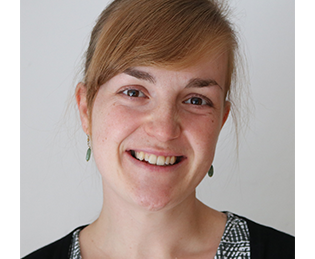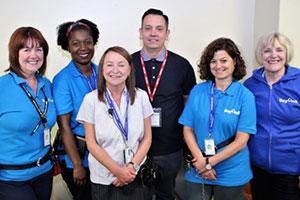Rosie Hart, the director of Kairos Women Working Together, discusses with the Custodial Review the work which the small Coventry charity does to support women prisoners at risk of exploitation, including women in prostitution.
Could you outline the work you do with women in prisons?
Kairos Women Working Together (KairosWWT) is a grassroots charity in Coventry supporting women at risk of sexual exploitation, including those caught up in prostitution. We meet our service users through outreach and drop-in sessions that we run, as well as receiving referrals from probation services, prisons that know of our work and from other partner agencies locally.
Our work doesn’t just cover when a woman goes to prison – we liaise with all areas of a woman’s engagement with the criminal justice system. This includes supporting women to engage with probation appointments, attending and sometimes advocating for her at court appearances, as well as then visiting women in prison and working with her to plan for her release. Currently the majority of women from Coventry are sent to HMP Peterborough and Drake Hall, though we also find our service users are more and more frequently getting sent further afield.
What is your opinion on short sentences for women – should they be abolished?
Based on the experiences of the women we support, we believe short sentences should be abolished, unless the support and communication system is significantly overhauled. Let me tell you why.
Let’s picture Michelle (name changed). She’s 26. She was abused as a child, grew up in care and has no family or positive support networks. When she left care at 18, she met a man who promised to care for and support her. But he introduced her to drugs, exploited her with his friends and she became addicted to heroin. Michelle now sells sex on the street of Coventry to get the money she needs, as well as committing petty crimes such as shoplifting to feed her habit. She’s got bipolar disorder, a long history of trauma and extremely low confidence and self-esteem. She hardly trusts anyone.
Michelle has been given temporary accommodation by the council in a local hotel, which has taken weeks of back and forth by a Kairos project worker to encourage Michelle to engage with the support available. She’s just starting to settle and get used to where she is. She’s also been supported to start the process to get a methadone script which would help control her drug use – but this process takes at least two weeks and hasn’t been completed yet. One weekend, Michelle is caught shoplifting and due to previous convictions is given two weeks in prison.
What happens to her now? Michelle’s application to get scripted is discontinued. She starts to ‘rattle’ in prison, as her body craves the drugs its used to. She creates trouble with the prison staff because she feels so ill, isolated and upset. When Michelle leaves prison, she doesn’t even make it back to Coventry, despite plans in place from Kairos to meet her and get support for her. She goes on a ‘bender’ and starts using drugs again as soon as she leaves.
The two-week prison sentence has also cost Michelle her hard fought-for accommodation. She eventually turns back up in Coventry, but now she’s street homeless. She has no access to her own bank account, no ID, and housing won’t consider as having a ‘duty of care’ because by going to prison for two weeks she’s now classed as becoming intentionally homeless, so they won’t house for her another six months. Her only option is the rough sleeper accommodation, which is open rooms, shared male and female. Michelle prefers to be on the streets because she doesn’t feel safe there. Michelle’s back on the streets and no better than before.
All the reasons that lead to Michelle shoplifting in the first place haven’t been addressed – and now she’s got an additional criminal conviction, further affecting her future opportunities. The fortnight in prison has cost the state thousands of pounds, yet has achieved nothing positive for the woman involved or the local community by making it less likely that she will re-offend.
What could policy-makers do to reduce reoffending among the women in prison who you work with?
In our experience, things that policy-makers could do include:
• Increase funding for organisations that deal with the reasons why women like Michelle are offending in the first place – such as trauma, isolation, drug addictions and family breakdown. Stop insisting on quick results for long-term problems and engage with the complexity of people’s lives, by meeting service users and understanding their experiences.
• Improve and expand the use of women’s organisations (or other services that the person is engaging with) for community engagement/court orders to reduce the amount of different services the person has to liaise with, and also so they can continue to work with people and teams they already know and trust
• Increase the availability of housing for vulnerable women and improve the communication process between prisons, resettlement teams and housing services to make sure everyone gets accommodation upon release. We consistently have to pester for accommodation to be arranged for women who are getting released that we are supporting, because sadly we can’t guarantee it will have been arranged. We are happy to advocate for women in this way but really this shouldn’t be our job, and uses a lot of our precious resources when we could be planning to support the women in other areas. 
Can you give a case study of a successful outcome for a prisoner?
Charlie (name changed) is a service user known to Kairos for a couple of years who occasionally attends our Evening Drop In. She is a victim of rape, domestic violence and has been in prison multiple times in the last year, for offences including theft. In the last year, we have visited Charlie five times at Peterborough, spending time building trust and relationship. Since release, we arranged for Charlie to get support from Coventry Rape and Sexual Abuse Centre as she has been a victim of domestic violence and also disclosed rape. Typically Charlie has very poor engagement with services, including probation. In the last few months we have provided intense support, regularly calling Charlie to remind her of her appointments, pick her up to take her to them, and provide regular encouragement as she has no positive social networks.
Kairos has acted as the central point of contact for probation, advocating for her multiple times to arrange extensions, explain her specific needs when her probation officer changed, and get probation meetings held in a different location, as Charlie feels very uncomfortable at the probation offices, which are a barrier to her attendance. Both Charlie and her probation services have said that if it wasn’t for Kairos’s support she would have been recalled and be back in prison again by now.
Unfortunately, drug services were not co-ordinated for release so when she returned to Coventry she lapsed. She told us how she was very distressed because she forgot her daughter’s birthday, and shared about the impact of the trauma caused by her abuser. Charlie had been offered emergency accommodation but was evicted for drug paraphernalia in her room, part of an overall sweep by the housing provider and classed as 'intentionally homeless' for six months. We contacted the Law Centre about a potential appeal but nothing could be done. Fortunately, Kairos has a relationship with a local social housing provider who were willing to accommodate Charlie in one of their properties.
Since then, we have supported her to attend a medical assessment for her mental health. This means she now has a sick note so that she can now claim the benefits to which she's entitled. We have also provided clothing, toiletries and food bank vouchers when she was first getting settled in her property and before benefits were arranged. We have also been central contact for Victim Support who offered Charlie the chance to testify against her abuser.
She is now living independently in a property and currently maintaining the tenancy. She continues to access support from Kairos. In 2017, in her own words Charlie was "in and out of jail all the time". Thanks to support from Kairos working closely with Charlie, she hasn't returned to jail at all in 2018. Her challenges aren't over but she now has the stability and support she needs to take the next steps forward in her life.
For more information on Kairos Women Working Together, see kairoswwt.org.uk





